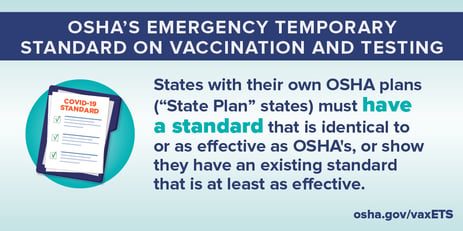***PLEASE NOTE: As this story continues to evolve, we'll keep you informed on the latest updates.
OSHA is withdrawing its vaccination and testing Emergency Temporary Standard (ETS) issued on Nov. 5, 2021 that would have been applicable to employers with 100 or more employees. The withdrawal is effective immediately. Although OSHA is withdrawing the vaccination and testing ETS as an enforceable temporary standard, the agency is not withdrawing the ETS as a proposed rule.
If you are confused about vaccination and testing compliance, you are not alone. The following includes background about OSHA's vaccination and testing ETS.
OSHA & COVID-19: Workplace Protection & Enforcement
 The Occupational Safety and Health Act of 1970 (OSH Act) protects workers from being seriously harmed at work. The law also created the Occupational Safety and Health Administration (OSHA), the regulatory group which establishes and enforces protective workplace safety and health standards and provides safety information, training, and assistance to employers and workers. Under the OSH Act, employers are held accountable for the safety of their employees and responsible for providing a safe and healthy workplace that is free from recognized hazards that may cause death or serious physical harm.
The Occupational Safety and Health Act of 1970 (OSH Act) protects workers from being seriously harmed at work. The law also created the Occupational Safety and Health Administration (OSHA), the regulatory group which establishes and enforces protective workplace safety and health standards and provides safety information, training, and assistance to employers and workers. Under the OSH Act, employers are held accountable for the safety of their employees and responsible for providing a safe and healthy workplace that is free from recognized hazards that may cause death or serious physical harm.
 Employers Must Comply with OSHA Standards. Employers must follow a list of safety mandates, which addresses such areas as using personal protective equipment, posting and record-keeping requirements for work-related injuries and illnesses, and identifying and correcting known health hazards. It also prohibits retaliation against other workers for exercising their rights under the law. Employers with 10 or fewer employers may be exempt from some of the standard OSHA requirements.
Employers Must Comply with OSHA Standards. Employers must follow a list of safety mandates, which addresses such areas as using personal protective equipment, posting and record-keeping requirements for work-related injuries and illnesses, and identifying and correcting known health hazards. It also prohibits retaliation against other workers for exercising their rights under the law. Employers with 10 or fewer employers may be exempt from some of the standard OSHA requirements.
 Employers are also legally required to comply with all of the safety rules outlined in OSHA Standards. These requirements include mandates for fall protection, exposure to some infectious diseases, exposure to harmful substances such as asbestos and lead, safety guards on machines, respirators, and other safety equipment, and training. For example, in industries like construction and agriculture, the standards protect workers with certain safety guidelines related to hazardous chemicals, such as exposure amounts, safety practices, equipment, and monitoring procedures for specific hazards.
Employers are also legally required to comply with all of the safety rules outlined in OSHA Standards. These requirements include mandates for fall protection, exposure to some infectious diseases, exposure to harmful substances such as asbestos and lead, safety guards on machines, respirators, and other safety equipment, and training. For example, in industries like construction and agriculture, the standards protect workers with certain safety guidelines related to hazardous chemicals, such as exposure amounts, safety practices, equipment, and monitoring procedures for specific hazards.
Employers & Workers Protected Under OSHA. OSHA protection applies to most private sector employers and workers in all 50 states, the District of Columbia, and other U.S. jurisdictions directly through Federal OSHA or an OSHA-approved state program. It also applies to federal government workers at all federal agencies.
Federal OSHA does not cover state and local government workers, but they are protected if working in states operating their own program. States with approved health and safety programs include: AK, AZ, CA, CT, HI, IA, IL, IN, KY, MD, MI, MN, NC, NJ, NM, NV, NY, OR, SC, TN, UT, VA, VT, WA, WY, Puerto Rico, and the Virgin Islands. Self-employed workers, and workplace hazards regulated by another federal agency, for example, the Department of Energy, are not covered by the OSH Act.
COVID-19 EMERGES: New Virus Poses a Significant Health and Safety Threat
Covid-19, an infectious disease caused by the SARS-CoV-2 virus, emerged in late 2019 and quickly spread. On March 13, 2020, the U.S. declared Covid-19 a national emergency by Proclamation 9994. Because Covid-19 was a novel virus, there were many unknowns, and businesses across all industries were faced with new and ever-changing safety challenges.
 In response, OSHA introduced the National Emphasis Program (NEP)for Covid-19. The NEP targeted large companies and certain high-hazard industries, which presented the highest risk for Covid-19, with guidance on protecting workers from Covid-19 exposure, as well as compliance policies, and enforcement procedures.
In response, OSHA introduced the National Emphasis Program (NEP)for Covid-19. The NEP targeted large companies and certain high-hazard industries, which presented the highest risk for Covid-19, with guidance on protecting workers from Covid-19 exposure, as well as compliance policies, and enforcement procedures.
OSHA INTRODUCES ETS: New Rule for Covid-19 Vaccination & Testing
➡️ Nov. 5, 2021: OSHA Publishes ETS. Once the data and science of Covid-19 vaccines demonstrated effectiveness against the spread of Covid-19, OSHA introduces the Emergency Temporary Standard (ETS), a set of vaccination and testing mandates focused on protecting unvaccinated workers. On Nov. 5, 2021, OSHA publishes ETS and it becomes law.
.png?width=463&name=ets2-toolkit-2%20(1).png) Under the ETS, private employers with 100 or more employees were required to develop, implement, and enforce a mandatory Covid-19 vaccination policy for employees or a policy allowing the option of vaccination or proof of weekly Covid-19 testing and wearing a face covering while at the workplace.
Under the ETS, private employers with 100 or more employees were required to develop, implement, and enforce a mandatory Covid-19 vaccination policy for employees or a policy allowing the option of vaccination or proof of weekly Covid-19 testing and wearing a face covering while at the workplace.
The ETS was to remain in effect for six months from publication or May 5, 2022. Covered employers had to meet the compliance deadlines of Dec. 6, 2021, for activities such as developing policies for vaccination and masking and determining the vaccination status of all workers. By Jan. 4, 2022, employers were also required to ensure weekly testing of unvaccinated employees.
ETS LITIGATION TIMELINE: Is Covid-19 a General Hazard or a Workplace-specific Hazard?
➡️ Nov. 6, 2021: The ETS is Stayed by the U.S. Court of Appeals for the Fifth Circuit. Once ETS was published, the legal battle began. Were the mandates under the OSHA’s ETS valid? Various groups, both public and private, quickly challenged OSHA’s new rule in a number of circuit courts nationwide. Ultimately, the ETS was blocked by the U.S. Court of Appeals for the Fifth Circuit.
➡️ Nov. 30, 2021: Vaccination Mandate for Federal Contractors is Blocked in Three States. A federal district court in Kentucky temporarily blocked the mandate requiring employees of federal contractors and subcontractors to get vaccinated. The district court’s ruling applied to Kentucky, Ohio, and Tennessee.
➡️ Dec. 7, 2021: The Vaccination Mandate for Federal Contractors is Blocked Nationwide. A federal district court in Georgia temporarily blocked the vaccine requirement for federal contractors nationwide.
 ➡️ Dec. 17, 2021: The Stay is Lifted by the Sixth Circuit U.S. Court of Appeals. A three-judge panel from the Sixth U.S. Circuit Court of Appeals lifted the stay on the ETS and extended the deadlines to provide employers with enough time to comply.
➡️ Dec. 17, 2021: The Stay is Lifted by the Sixth Circuit U.S. Court of Appeals. A three-judge panel from the Sixth U.S. Circuit Court of Appeals lifted the stay on the ETS and extended the deadlines to provide employers with enough time to comply.
➡️ Jan. 13, 2022: The U.S. Supreme Court Blocks the ETS. While Covid-19 continues to be a threat, it is not an occupational hazard or workplace-specific danger. Therefore, OSHA did not have the authority to enforce the rule as it was published. On Jan. 13, 2022, the U.S. Supreme Court blocks the ETS. In a separate opinion, the Supreme Court allowed the federal Centers for Medicare and Medicaid Services (CMS) the authority to require Covid-19 vaccination for health care workers at Medicare- and Medicaid-certified providers and suppliers.
➡️ Jan. 26, 2022: OSHA Withdraws its Vaccination and Testing ETS. The case pending before the Sixth Circuit is dismissed.
WHAT DOES THIS MEAN FOR EMPLOYERS?
 Employers Remain Accountable for Workplace Safety. Employers are responsible for the safety of their workers and OSHA "Regardless of the ultimate outcome of these proceedings, OSHA will do everything in its existing authority to hold businesses accountable for protecting workers, including under the Covid-19 National Emphasis Program and General Duty Clause," said Secretary of Labor Marty Walsh in a statement regarding the Supreme Court ruling on OSHA's vaccination and testing ETS.
Employers Remain Accountable for Workplace Safety. Employers are responsible for the safety of their workers and OSHA "Regardless of the ultimate outcome of these proceedings, OSHA will do everything in its existing authority to hold businesses accountable for protecting workers, including under the Covid-19 National Emphasis Program and General Duty Clause," said Secretary of Labor Marty Walsh in a statement regarding the Supreme Court ruling on OSHA's vaccination and testing ETS.
More Developments at the State Level. This recent decision now leaves the states free to regulate and pass any COVID-related vaccination laws. States have been and expected to become even more active in creating their own regulations in this area.
Currently,  22 states have their own OSHA Plan that governs both private and public employers, and 11 states have either bans or additional required exemptions from vaccine-related mandates. In addition, some states and/or cities have issued private employer vaccine mandates that employers must follow or face penalties. More developments at the state and local levels are expected, so stay informed to ensure compliance as it applies to your business and where you operate.
22 states have their own OSHA Plan that governs both private and public employers, and 11 states have either bans or additional required exemptions from vaccine-related mandates. In addition, some states and/or cities have issued private employer vaccine mandates that employers must follow or face penalties. More developments at the state and local levels are expected, so stay informed to ensure compliance as it applies to your business and where you operate.
More Developments Expected on Vaccination & Testing Rules. While OSHA withdrew the ETS as an enforceable emergency temporary standard, the agency is not withdrawing the ETS as a proposed rule. The agency is also “prioritizing its resources to focus on finalizing a permanent COVID-19 Healthcare Standard."
PLEASE NOTE: This information is for general reference purposes only. As we continue to work during the pandemic, laws, regulations, and filing deadlines are likely to change. Please check with the appropriate organizations or government agencies for the latest information and consult your employment attorney and/or benefits advisor regarding your responsibilities. In addition, your company may be exempt from certain requirements and/or be subject to different requirements under the laws of your state. (Updated Jan. 26, 2022)
 About Propel HR. Propel HR is an IRS-certified PEO that has been a leading provider of human resources and payroll solutions for 25 years. Propel partners with small to midsized businesses to manage payroll, employee benefits, compliance and risks, and other HR functions in a way that maximizes efficiency and reduces costs. Visit our new website at www.propelhr.com.
About Propel HR. Propel HR is an IRS-certified PEO that has been a leading provider of human resources and payroll solutions for 25 years. Propel partners with small to midsized businesses to manage payroll, employee benefits, compliance and risks, and other HR functions in a way that maximizes efficiency and reduces costs. Visit our new website at www.propelhr.com.









